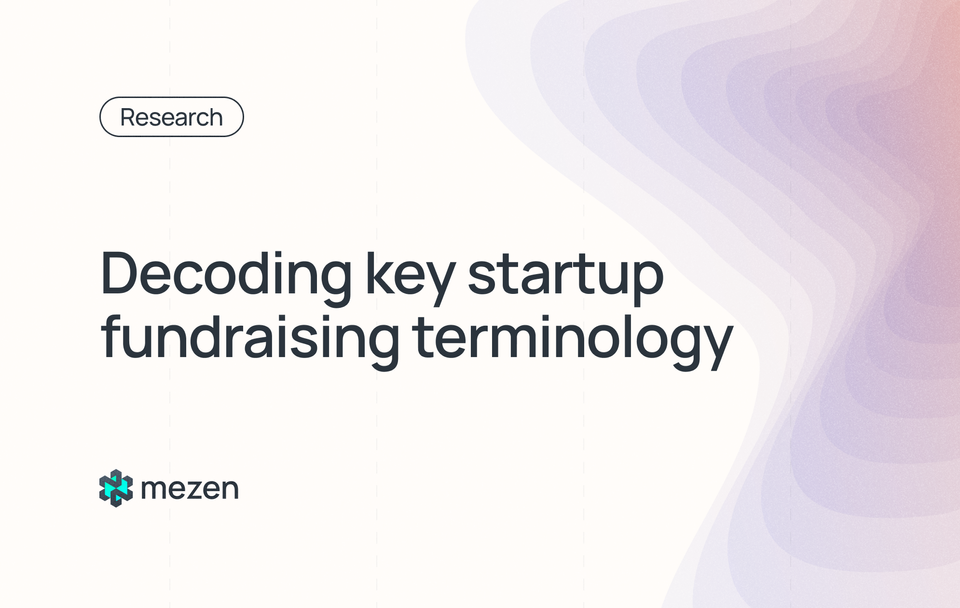Decoding key startup fundraising terminology

Learning the terminology, acronyms, and specific concepts related to startup fundraising is an unavoidable consequence of entering the field. Whether seeking seed capital for early traction or pursuing an A series to fuel hypergrowth, managing these conversations necessitates an understanding of important words that influence everything from founder motivations to investor returns.
However, where should time-crunched entrepreneurs turn to efficiently decipher fundraising's own language during already hectic days producing products and courting clients? Long textbooks offer extensive minutiae that even experienced founders rarely use in practice. Generic internet glossaries provide definitions without strategic context.
This guide focuses on the most important terms in startup finance. Understanding these fundamental fundraising building blocks gives founders the confidence to analyse transactions, create agreements, and fulfill ambitions larger than bootstraps allow. Let's delve into the concepts that drive today's capital-raising talks!
Let's start with your startup valuation to see how much you can ask for, and then dive into the language.
Valuation
Pre-money valuation
The pre-money valuation represents the company's value prior to receiving any external investments or funding. This valuation is based on a number of criteria, including the company's financials, comparable market exits, and the makeup of its founders and staff.
Post-money valuation
The post-money value shows a company's projected worth after receiving external investment or funding. Investors use post-money valuation as a criterion to determine their ownership position in the company.
It's critical to emphasise one feature of the post-money cap: it’s critical to the conversion process. Specifically, it serves as a cap for the SAFE round during the conversion event, which transforms all convertible securities. It is important to note that this cap applies to the SAFE round rather than the equity round that triggers the conversion.
Common investment instruments
Convertible notes
Convertible notes, also known as convertible promissory notes, are short-term financial securities that convert into equity following a predefined occurrence.
Founders receive convertible notes from investors in return for equity in the business. At a later stage, such as a future fundraising round or a liquidation event (acquisition, IPO, etc.), these notes are converted into equity, typically in the form of preferred shares, giving the investor ownership of the firm.
SAFE
SAFEs serve as a kind of convertible financing. When investors participate in a SAFE, the provisions allow them to convert their SAFE into equity during the company's next equity financing round or in the case of a liquidation.
Typically, the conversion terms are based on a discount rate or a valuation cap.
Valuation cap: This is the highest price at which a SAFE can convert. A lower cap benefits investors by allowing them to convert notes into a greater number of business shares.
Discount rate: The discount rate represents the discount to the priced round valuation and determines the benefit to investors. A higher discount puts investors in a better position because it lowers the valuation used to compute their shares, allowing for a higher conversion into equity.
SAFT
A SAFT is a contractual investment arrangement in which investors agree to finance Web3 projects. In exchange, they will receive reduced cryptocurrency tokens at a later date.
Share dilution
Share dilution, also known as equity dilution or stock dilution, is the decrease in ownership percentage for current shareholders when a firm issues or reserves new shares of stock.
Dilution is often caused by the closing of a funding round, enlarging the employee option pool, taking the firm public, or selling tokens publicly.
Cap table
A capitalisation table (cap table) summarises a company's securities, such as common and preferred stock, options, SAFEs, convertible notes, tokens, and warrants. It includes the percentage of each investment type owned by investors, the value of their interests, and their current ownership percentage.
Essentially, a cap table is a thorough record of information that investors would seek about a company's ownership.
During finance discussions, parties frequently construct a pro forma capitalisation table, which shows the revised ownership structure following the conclusion of a fundraising round. This allows parties to predict how ownership may change after financing.
SAFEs and equity dilution
SAFEs postpone stock dilution until the next eligible financing round. SAFE holders receive shares in the future, typically at a discount, in exchange for an early-stage investment.
Pre-money SAFEs leave ownership percentages undecided until the next round, potentially making them less dilutive for founders.
Post-money SAFEs, on the other hand, allow investors to secure their ownership stake before more investors join in a priced funding round. While this improves ownership certainty, post-money SAFEs may be viewed as less founder-friendly because they simply dilute the founders' ownership percentage.
Dilution vs. capital needs
Founders must balance the amount they aim to raise with consideration for future rounds, taking into account potential dilution. The level of dilution can vary, but here are general benchmarks for founder dilution from Carta:
- Seed: 10% - 25%
- Series A: 20% - 30%
- Series B: 25% - 40%
- Series C and later: Highly dependent
Employee option pool
An option pool is often expressed as a percentage of fully diluted share capital, which includes shares and share options that have not yet been granted, as well as those that have already been assigned to owners.
According to Ledgy's 2023 State of Equity and Ownership report, European companies typically offer option pools of 10% to 15%, whereas US companies allocate more generously, with employee option pools ranging from 15% to 20%.
Conclusion
The slang of startup fundraising may appear confusing at first, but understanding important concepts enables founders to fully connect with investors, analyse deals, and form agreements that drive growth. Understanding pre-money vs. post-money valuations, common instruments such as SAFEs, and the nuances of dilution enables you to manage difficult talks with clarity and confidence. With these basics in place, you can start planning sensible financing solutions that will transform capital into long-term momentum. Use this article as a reference as you bring your vision to life, and don't be afraid to seek the advice of Mezen's expert consultants to assist you in understanding the finer nuances.
The research has been prepared by:



Comments ()